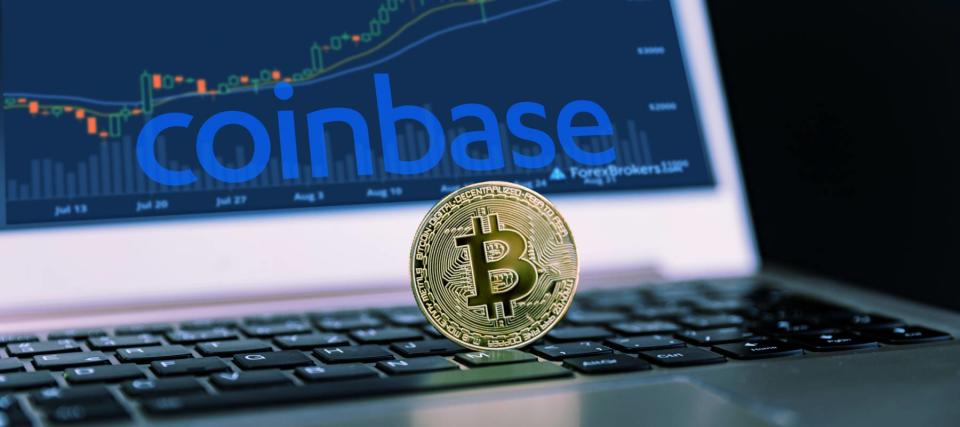Thanks to Coinbase's market debut, your portfolio is likely linked to crypto

You may not have noticed it as it was happening — the sky didn’t turn yellow, the seas didn’t boil — but the world, for investors at least, changed forever on Wednesday.
At 1:24 p.m. EST, Coinbase, the world’s leading cryptocurrency transaction platform, made its debut on the Nasdaq. It was the first crypto startup to trade on the exchange.
And when the dust had settled at the end of the trading day, Coinbase’s market value wasabout $86 billion, after having risen well about $100 billion earlier in the day — good enough to be counted among America’s top 100 publicly traded companies.
Which means that if you’ve set up an investment portfolio with index funds and ETFs, it’s highly probable that you own a small piece of Coinbase.
Confused? Alarmed? Don’t be. Here’s what the Coinbase debut means for everyday investors.
How are you affected?

Coinbase’s going public is, quite literally, a big deal.
On Monday, the company’s valuation, based on a Nasdaq reference price of $250 per share, was approximately $65 billion, making Coinbase more valuable than the Nasdaq itself.
After launching on Wednesday at an opening price of $381, Coinbase shares hit a high of $429.54 before receding to around $330 per share at 4:00 p.m.
At its highest point during the inaugural trading day, Coinbase’s valuation eclipsed the $100 billion mark — not far off the $104 billion peak that Facebook achieved on the day it went public in 2012.
“Coinbase is now worth more than Goldman Sachs, who called #bitcoin ‘not an asset class’ last year,” the popular Twitter account Documenting Bitcoin wrote on Wednesday.
Now that Coinbase is among the most valuable assets on the Nasdaq — and one of the 100 highest-valued publicly traded companies in America — it will receive a spot in both the Nasdaq Composite Index and the S&P 500, two influential indexes that allow investment funds to place their bets on each one’s top companies.
That means investors who own shares in any index funds or ETF designed to track the stock market will have Coinbase and, by extension, cryptocurrency in their portfolios.
That might seem a bit ironic. Whereas cryptocurrency has a reputation for being the investment of choice for a lot of get-rich-quick types, ETFs and funds tied to indexes like the S&P 500 are often recommended as a means of building a balanced, reliable portfolio that will grow steadily over the long term and fund a prosperous retirement.
Will a crypto crash sink your portfolio?

Because Coinbase makes most of its money through transaction fees, which users must pay any time they buy, sell or withdraw their crypto assets, the company relies on high trading volumes to generate profits
And because those fees are based on the price of the asset being traded, crypto values, which are beyond Coinbase’s control, need to stay high for the company to maintain its current level of profitability.
It’s pretty easy for Coinbase’s profits to skyrocket when Bitcoin is trading for more than $63,000, as it was at time of writing. It would be a different story if a crash resulted in Coinbase users swapping Bitcoin valued at “only” $6,000.
Such an event would be nauseating for Coinbase and anyone who directly owns shares in the company, but if you own shares in a passive index fund that includes Coinbase, you needn’t worry about a crypto crash eviscerating your portfolio.
Index funds are designed to include a large and diverse quantity of investments by representing all the companies in the underlying index.
That lowers investors’ risk, since no single stock is leaned on too heavily.
If crypto values fall through the floor, they should only impact the small fraction of your index fund or ETF represented by Coinbase.
Your portfolio’s value could continue to grow, no matter what Bitcoin is fetching on any platform that allows crypto trading.
What’s the play?

Just because Coinbase has brought cryptocurrency into the investing mainstream doesn’t mean digital currencies are any easier to understand.
But Mad Money host Jim Cramer says that shouldn’t stop you from incorporating crypto — and its gains — into your portfolio.
"You don’t have to be a believer in crypto the concept to believe in crypto the investment," he said on Tuesday.
Thanks to the new generation of do-it-yourself investing apps, it’s never been easier to put together a portfolio and grow your money in the market.
One popular app automatically invests your spare change.
Another even allows you to invest in U.S. farmland, which historically has delivered even better returns than the stock market.
Coinbase and crypto may have changed investing forever, but the broader stock market is still the same reliable money-making engine it’s always been.

 Yahoo Finance
Yahoo Finance 